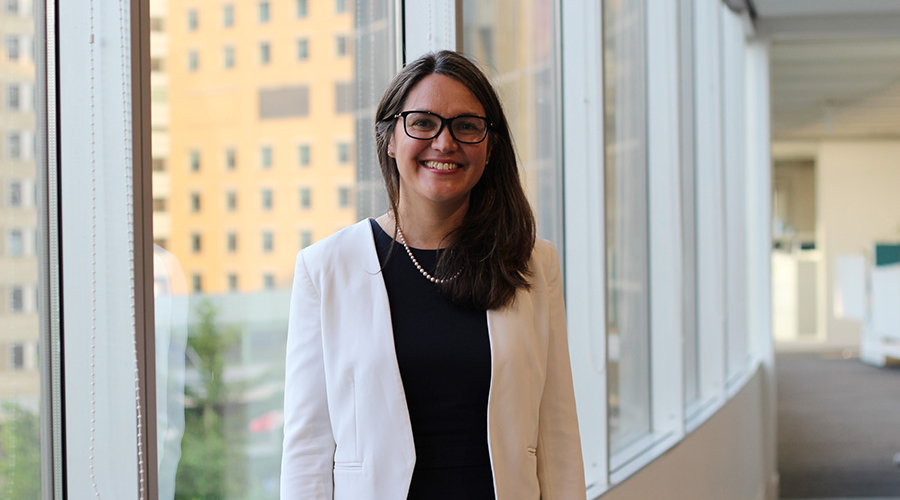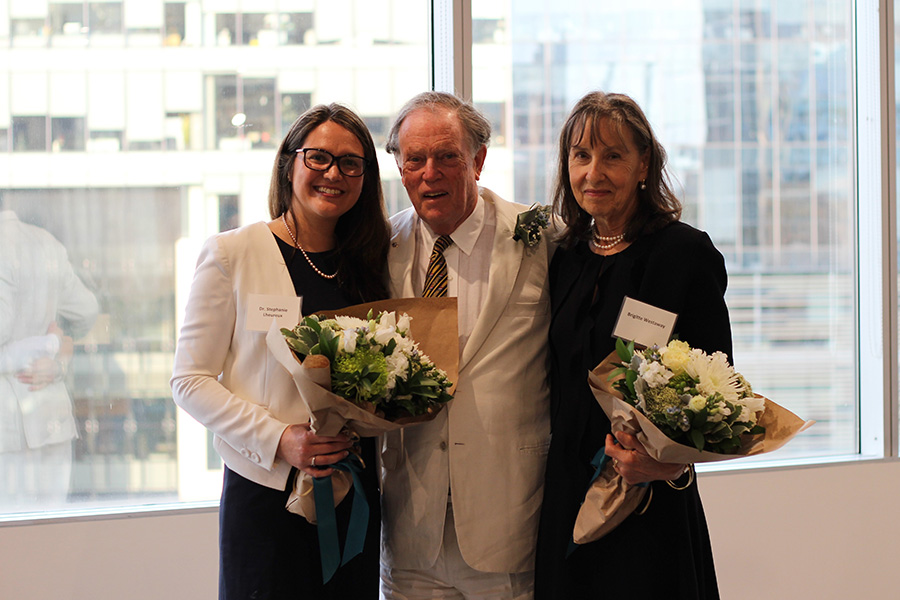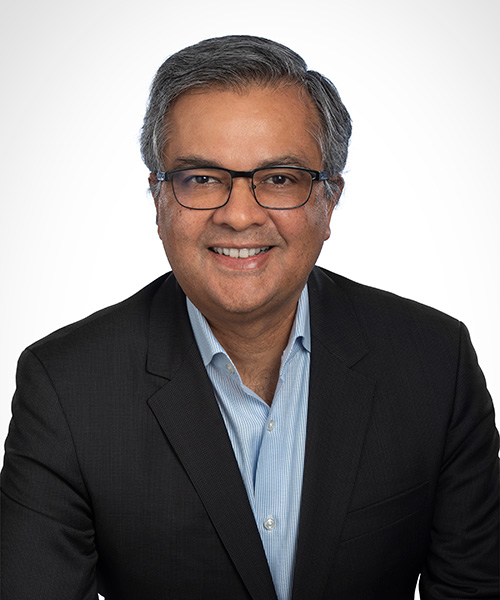
Instead, you will find pictures and cards from her patients, patients diagnosed with and treated for ovarian cancer at Princess Margaret Cancer Centre.
"They say the ovary is the organ that gives life, then takes life away so unexpectedly," says Dr. Lheureux.
That's why she has dedicated her life to researching ovarian cancer, studying the development of new treatments in the lab and working with clinicians to create a better life for her patients.
"My patients are my driver to do better every day. All the mothers, grandmothers, wives, partners, friends, sisters and daughters – they are all such strong and inspiring women," she says.
"We need to do better, for them."
Peter and Brigitte Westaway, along with the Princess Margaret Cancer Foundation, are celebrating the inaugural appointment of Dr. Stéphanie Lheureux as the Westaway Chair in Ovarian Cancer Research. Thanks to the Westaway Scholarship program, Dr. Lheureux hopes to make the Princess Margaret a hub for ovarian cancer, fostering global research and innovation to improve the treatment of the disease in the future.
"Our goal is to highlight ovarian cancer as an important area of research not only at Princess Margaret Cancer Centre, but globally," says Dr. Lheureux, Site Lead of the Gynecologic Oncology Clinic at the Princess Margaret.
The hub will operate at the local, national and international level not only to foster collaboration between world-leading experts, but to create an exciting and productive environment that will attract the next generation of students in training – a critical precursor to understanding and treating ovarian cancer – and something they couldn't do without the help of the Westaway Family
"There is definitely hope for ovarian cancer patients, but we cannot do this alone," she says.

(Photo: UHN)
"One of the biggest challenges is the lack of detection; since we cannot screen for it, we cannot detect it until it's very advanced," Dr. Lheureux explains.
This is why ovarian cancer is often referred to as a "silent killer"; symptoms may be vague and can go undiagnosed for long periods of time.
"This is the same problem at the time of reoccurrence," Dr. Lheureux says. "After initial surgery and chemotherapy, we do not see any signs of cancer, then boom – suddenly it has come back."
Unlike other cancers, the ovarian kind is very difficult to detect and can therefore be challenging to treat. Hence, treatment with precision medicine and immunotherapy — the newest innovations in cancer care to date — is still under investigation with ovarian cancer.
"Right now, we know that most ovarian cancer types do not respond well to classic immunotherapy alone, and we need to understand why," Dr. Lheureux says, noting that there are many types of ovarian cancer, each possessing the ability to adapt to treatments in different ways.
"We need to leverage our scientific understanding of the disease and discover a new way to detect it in order to achieve precision medicine and develop new treatment options for patients at different time points of their journey," she says.
Once they understand how ovarian cancer evolves, they can begin focusing on developing new treatments very specific to the abnormality the tumour has in order to provide precise and individualized treatment to the patient as they need it.
"The biggest challenge is: what are the tests we need to use to detect it in practice, and in a timely fashion? Then, what is the best treatment to target this specific abnormality?"
Part of Dr. Lheureux's plan to tackle ovarian cancer is by adopting a "bench to bedside approach"; also known as "translational research," collaboration amongst health care specialists is needed to bridge the gap between science and the clinic— something she specializes in.
"It really takes a village to support our patients," she explains, emphasizing that a multidisciplinary team is the key to making progress. This includes surgeons, radiation therapists, medical oncologists, scientists and dedicated gynecologic nurses who really understand how to manage patients in the clinic, as well as dedicated clinical trials researchers and genomics platform to characterize the cancer’s behaviour.

Dr. Amit Oza, Head of the Division of Medical Oncology and Hematology at Princess Margaret Cancer Centre and Medical Director of the Cancer Clinical Research Unit, is looking forward to the future of ovarian cancer care with Dr. Lheureux's leadership. (Photo: UHN)
"Establishing the Westaway Chair in Ovarian Cancer Research with Stéphanie Lheureux as the inaugural Chair holder is a critically important milestone in the fight against this difficult disease," says Dr. Oza, who is also the Princess Margaret's Medical Director of the Cancer Clinical Research Unit.
“She recognizes that treating ovarian cancer is a team sport. Her leadership will allow a deeper understanding of ovarian cancer biology to improve precision therapy for patients, to accelerate our ability to control and hopefully cure."
While the future is bright for ovarian cancer patients, Dr. Lheureux says it wouldn't be possible without the support of the Westaway family.
"This cause is dear to my heart, and we can do it if we work together and have the support to do it," she says. "Passion can be transformative.
"If we continue moving forward in this direction, I'm hopeful we will begin to see meaningful changes in our patients' lives now, and for future generations to come.
This story first appeared on UHN News